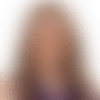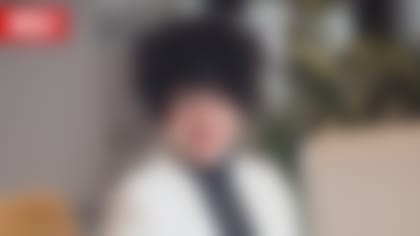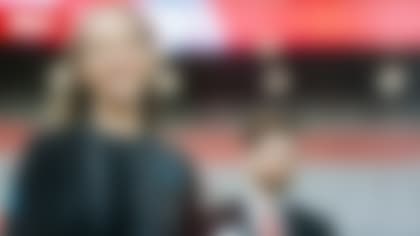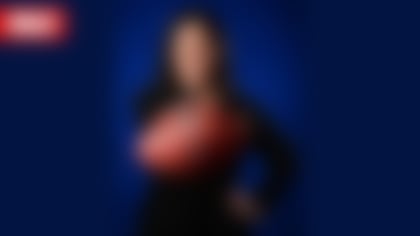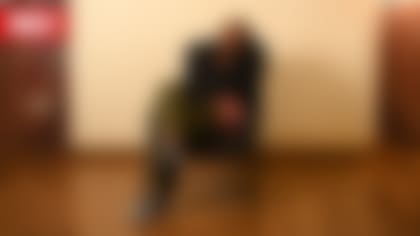Women are rising up the ranks throughout professional football, earning positions of power in a space that for too long was ruled almost exclusively by men. We're seeing more and more women breaking barriers in the sport, but what are the stories beyond the headlines? Who are the women shaping and influencing the NFL today? Answering those questions is the aim of the Next Woman Up series. While the conversational Q&As are edited and condensed for clarity, this is a forum for impactful women to share experiences in their own words. Without further ado, we introduce:
Fouzia Madhouni
Position: NFL mentee in the Global Sports Mentoring Program
* * * * *
When were you first exposed to American football?
I think it was 2013 or 2014. I was studying at university and came across my female classmate wearing a football helmet. I was interested in the game and asked her if I could join, so that's where it all started.
What was it about American football that drew you in?
Since I was very young, I was always attracted to the American culture. I was pretty shy and spent all my time home with my brother watching MTV -- which was accessible in Morocco -- or movies. I kind of knew about American football from TV and it looks really badass to see someone with a helmet and shoulder pads. I never saw women playing American football in movies, so I wanted to know more about it.
Did you experience any hardships when you started playing?
So I started playing tackle football. It was kind of an escape for me, because people don't know who you are when you wear a helmet. There were some women I played with but we didn't have much chance to play. We were in the team pictures but nobody actually gave us the access to play. We were paying to be part of the team, and we found it really difficult to have the same opportunity as the guys. We were mostly on the sideline watching the men playing the game, and we were more like cheerleaders than football players.
The women were practicing together during that time, and I was really bullied because I didn't come from the accepted social class. I remember I was wearing cleats from a thrift shop and one girl who came from a rich family bullied me. I guess because of her and other people who told me I couldn't play because I was a woman from the wrong social class, I was driven to play. I always thought about what they thought about me. From there, I started a flag football team. I was playing and coaching, and we were able to make it work.
I saw in your NFL 360 feature that you were diagnosed with cancer shortly after that. What kind of perspective did that experience give you?
It was very hard. I was viewing football as a competitor and wanted to be the best and be the first female in Morocco to do this or that. Cancer made me look at football a different way. I never thought about what football did for me until then. After I had cancer, I started appreciating the little things in life -- like walking. I started seeing football from a new perspective. Instead of seeing it as a competition, I saw it for how it can impact life.
When I was doing chemotherapy, I always held a football at the clinic because I thought it was the way I could escape. I always told my mom that I was going to start a football academy after treatment. My family didn't believe it because I was in a really hard situation at the time. Walking was the biggest dream out there.
When did you start We Can Morocco? How has the organization grown?
It has grown incredibly compared to a lot of organizations in Morocco. Before the NFL documentary, we had only one We Can academy. Now we have two academies for girls and boys in Morocco. We educate through sports, providing English and French courses, leadership classes and other things. Also, we launched a program called No Barriers Project, in which we provide kids with Down syndrome access to flag football.
We are aiming now to give girls in rural areas access to flag football as a competitive outlet, but we also want to help raise awareness of things considered taboo to discuss in Morocco, such as sexual harassment, and make sure they know when something isn't right. We want to give them a safe space.
That is truly amazing work. What is your ultimate goal for your organization?
I would love to expand the business all over Morocco. Our 10-year vision is to have a We Can Morocco-type organization in Egypt and all over the African continent. This is the goal now, and hopefully we can expand to the Middle East, as well.
Last year, I worked with the Egyptian Federation of American Football to organize the first-ever flag football tournament in Africa called the African Flag Ladies Cup. It was right after I finished my first cancer treatment. There were four teams in the tournament -- two Egyptian teams, the Eagles Athletic Club and Cairo Bears, the Moroccan Jaguars and one American team, the Philadelphia Phantomz.
It was really emotional for me, but it was eye-opening. Instead of seeing football as a player from the sideline, I realized I wanted to view it from the top and help organize and lead. We actually discovered our mission and vision for the We Can academies clearly after that tournament.
When and how did you find out that you were going to be part of the U.S. Department of State and espnW's Global Sports Mentoring Program? And what was your reaction to the news?
About a year ago, I was in Morocco and received a call from the U.S. Embassy in Morocco, and they told me I was nominated to represent women's sports for Morocco in the Global Sports Mentoring Program. There were a lot of people nominated and I was chosen somehow.
My first experience with the program was through Gatorade and it was virtual. That was the first time I was connected with the NFL, NFL International, NFL Films, etc. They became a huge source of support for me during that mentorship program.
This year, I received an email from the program that said I'd be mentored by the NFL and the Green Bay Packers and it was going to be in person. I actually jumped in happiness when I read it because it's an honor and a dream to be mentored by one of the biggest sports organizations in the world. I am so happy to be here, and I've learned a lot about the NFL. I've also learned about some of the initiatives that are impacting lives, including mine.
What was the biggest thing you learned during your two weeks in Green Bay and New York?
I never knew the Green Bay Packers were a publicly owned organization, and I was very impressed by the work the Packers do in the community. I was able to coach in the Packers' Football Outreach Camp, and I enjoyed every moment of it because it was truly for the kids, which is what I'm doing in Morocco.
It inspired me a lot, and I have so much respect for the organization and what they do as a football team and in the community. It was cold, but I really enjoyed it. I would like to go back but maybe in the summer.

In New York, the program made sure I was introduced to the right people and contacts. I learned a lot about marketing and how I can help my business grow in Morocco. I also learned from NFL International about the football opportunities that would be helpful for the youth in Morocco. One of my dreams is to grow as a coach as well, so they provided me with tips and resources to make me better.
Do you have any mentors who have helped you along the way?
My first mentor is my mom even though we have our differences because we are from different generations. I am pretty stubborn but I always knew that I didn't want to be average. That was scary for her. But I always believed I could do it. If God gave me these thoughts and plans in my mind, it means that he knows I'm capable of doing them.
Now I have many mentors but one of my first mentors is Amine Zariat, a former professional basketball player who was part of a program called the International Visitor Leadership Program, which is like the Global Sports Mentoring Program. He then started Morocco's first basketball academy, which has the same mission as what I'm doing now with We Can Morocco. He opened a lot of doors for me and I really appreciate him.
Now, being a mentor for young women in your organization, what advice do you give them?
It's not always about having a great time and laughing when things are OK. It's showing up when things are not OK. It's about supporting each other and the mission we have in order to make better futures for these girls and our community.
